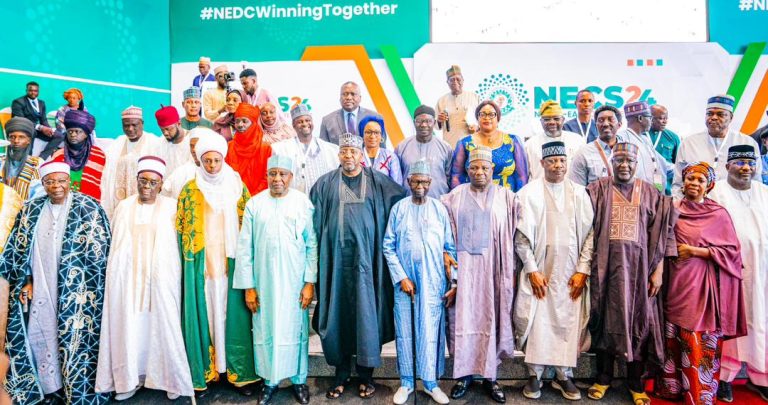Nigeria’s Vice President, Sen. Kashim Shettima, has described the recent events as a stark reminder of the harsh realities of climate change and urged for immediate action to address its devastating effects.
Speaking on Wednesday in Gombe, where he opened a 2-day North-East Climate Change Summit organized by the North-East Development Commission (NEDC) at the International Conference Centre, Shettima emphasized the urgency of the situation. The summit’s theme was “Setting the Course for Sustained Climate Action in the North-East.”
Shettima stated, “We have watched in grief as lives, livelihoods, and communities have come under attack by climatic conditions which we don’t have control over but can have minimal effect if proactive measures are taken.”
ALSO READ: Lagos govt partners FG, private sector to boost tourism
He added, “As part of our nation, all of us must rise up to the challenge of the moment.
“This summit could not have come at a better time. We are in a critical period, and we cannot ignore how climate change is rapidly shaping the world.”
Represented by the Special Adviser on Special Duties to the President (Office of the Vice President), Moddibo Aliyu, Shettima noted that the current weather conditions are alarming, with fluctuations in water bodies and unstable weather patterns.
He remarked, “It remains clear that none of us is immune to this existential threat to our ecosystem. This summit signals an awakening that is long overdue.”
He highlighted Nigeria’s commitment to global efforts to combat climate change, referencing President Bola Ahmed Tinubu’s participation in international discussions.
Shettima emphasized, “With gas emissions, unless every individual and institution rises up, the result is to prepare for climate change.
“We have positioned ourselves at the forefront of global cooperation to implement solutions that can mitigate and reverse the effects of climate change.”
The Vice President added, “This summit is a vital step towards achieving our objectives. The climate change 2024 summit aims to achieve low greenhouse gas emissions and promote green and sustainable development.”
He outlined targets for achieving zero energy transition by 2060 and transitioning towards a local carbon economy.
Shettima said, “We understand that the path to zero emissions is not straightforward, but with these frameworks, we have shown our seriousness about leading the fight.”
He also underscored Nigeria’s commitment to the Great Green Wall project as a crucial part of the climate action strategy.
He stressed the need for proactive measures to address flooding and other climate impacts, urging continuous efforts and effective responses to these challenges.
He concluded, “We must address the challenges posed by climate change with dedication and commitment.
Your efforts to convene this summit reflect a collective response to this global issue. We stand ready to support you in ensuring its success and resilience.”
In his opening remarks, the Managing Director/CEO of NEDC, Mohammed Goni Alkali, said, “As we gather here today, we embark on a journey that addresses immediate challenges and sets the stage for long-term resilience and growth in the North-East Region.”
He reminded attendees that the NEDC was established to bring hope, stability, and development to a subregion that has endured many hardships.
Goni Alkali noted, “While we have made strides in rebuilding communities, the evolving climate crisis presents new challenges, from desertification and water scarcity to land degradation and biodiversity loss.”
He emphasized the summit’s role in exploring innovative solutions, sharing knowledge, and building partnerships to ensure the North-East adapts to climate change and becomes a model of climate resilience.
“Our objectives are to increase awareness, strengthen climate resilience, identify policy and governance gaps, and coordinate responses to environmental challenges.”
Goni Alkali reaffirmed NEDC’s commitment to sustainable development, aligning with the North-East Stabilisation and Development Master Plan, which incorporates climate action as a central element.
The summit was attended by State Governments from the North-East subregion, traditional rulers, academics, and other climate change stakeholders.
NIGERIAN TRIBUNE
